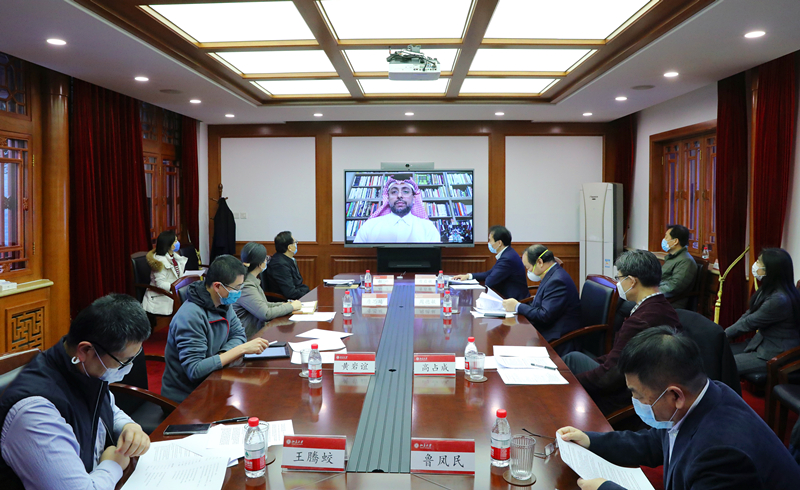COVID-19 Webinar | What does Peking University share with Qatar University?
Mar 20, 2020
Peking University, March 20, 2020: Medical experts and faculty members from Peking University (PKU) participated in a video conference with peers from Qatar University (QU) on March 19, sharing their expertise and experience with fighting against COVID-19. The two sides also updated each other on the latest situation on the pandemic in China and Qatar.
 PKU President Hao Ping speaks with QU President Hassan Rashid Al-Derham
PKU President Hao Ping speaks with QU President Hassan Rashid Al-Derham
Prior to the knowledge-sharing session, Peking University President Hao Ping delivered the opening remarks, emphasizing that PKU is glad to offer help and to share our experience and practices learned from fighting against COVID-19. Hao has been aware of the rapid growth of COVID-19 cases in Qatar, so he hopes that the online meeting will be a platform for our two universities to overcome the common challenges brought by the novel coronavirus. Hao also mentioned the warm assistance from Qatar to China during these difficult times and reiterated that both sides would stand by and support each other.
Hassan Rashid Al-Derham, president of QU, said it’s a great honor to have such a close partnership with Peking University, adding that PKU’s enthusiasm and efforts are what QU expects from a partner. Speaking highly of PKU’s efforts in the prevention and control of COVID-19, Al-Derham noted that PKU’s valuable experience is needed for QU’s attempts to support its local community.
Zhan Qimin, executive vice president of PKU and president of the Peking University Health Science Center, presided over the webinar. Zhan began by elaborating on the significant role of Peking University in the national anti-epidemic battle, including dispatching medical teams to aid Wuhan in combating the coronavirus, carrying out research on different facets of COVID-19, and making suggestions to the Chinese government for policymaking.
Additionally, medical experts from PKU highlighted the importance of taking drastic measures to protect students from contracting the coronavirus. The safety of each student is the top priority, so PKU made an announcement soon after the outbreak of COVID-19, asking students to receive online education at home and not to enter the campus until further notice. While some are doubtful whether students can adapt to online learning, faculty members from PKU saw that students became accustomed to it much faster than they expected, so the alteration would not be an obstacle for students but more likely to be a challenge for teachers who were not tech-savvy.
In response to what causes the sudden surge of mortality rate in countries like Italy, experts revealed that one of the reasons might be the lack of medical resources. The situation is similar to Wuhan, the worst-hit city in China, during the initial stage, but it was brought under control as a considerable number of medical workers rushed to the front line along with more medical supplies. Speaking of the growing number of imported cases in China, experts believe that China will not seal off the entire country considering the demand of sending Chinese medical teams abroad to help the fight against COVID-19 and offer China’s solutions to the global public health crisis. Nevertheless, some measures have been adopted to contain the rise of imported infections, such as the tighter border control and a mandatory 14-day quarantine for people arriving in Beijing.
While many questions concerning the novel coronavirus remain unresolved, both sides expressed the willingness to strengthen bilateral exchanges and share research findings in the future. In the meantime, PKU made a commitment that the university would continue to offer help and support amid the global outbreak of novel coronavirus.
Reported by: Huang Weijian
Edited by: Zhang Jiang, Trevor
